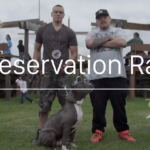By SHEILA M. POOLE
The Atlanta Journal-Constitution
ATLANTA (AP) _ Marvin-Alonzo Greer proudly donned the blue uniform of a federal soldier in the Civil War during a recent Juneteenth celebration at Atlanta Cyclorama. It’s similar to the uniform his ancestors wore before him.
A history major, Greer, 27, has traced eight of his relatives to federal regiments during the War between the States.
Some days, though, Greer gets more than his share of stares.
That’s because he’s among a few dozen black Civil War re-enactors in Georgia.
“I think it’s important to tell the story of people of color during the Civil War because they’ve been underrepresented in re-enactments and in history,” said Greer, a student at Morehouse College and a museum interpreter at the Atlanta History Center.
He said he does it to not only honor his ancestors in blue, but to honor all African-Americans “who fought in the Civil War, toiled in the fields as slaves or were freemen.”
Another black re-enactor, James Hayes, 58, of DeKalb County, said he decided to get involved in re-enactments in 1989 after reading an article that suggested African-Americans were less patriotic than whites.
“I got a little upset because several members of my family served in the military in World War II, Korea and Vietnam,” he said.
It’s hard to determine exactly how many African-Americans participate in re-enactments, in part because the ranks are so fluid.
People take part for a while, then drop out or only participate once a year.
Ray Wozniak, a white re-enactor, has long tried to get more African-Americans involved in the hobby he loves.
Wozniak said the 1989 movie “Glory,” which starred Denzel Washington and is based on the 54th Massachusetts Volunteer Infantry, “was a great crest we were able to ride” in terms of recruitment. But as the years passed, so did interest.
“Based on my experience, African-Americans don’t really wish to dwell too much on the Civil War because it was a painful time,” he said. “The ones who tend to get involved are historians and appreciate the full breadth of African-American history. They understand that this was a heroic period as well as a period of unique suffering.”
History is on his side.
In 1862, President Abraham Lincoln opened the door for African-Americans to enlist in the Union Army, according to the Library of Congress.
An estimated 200,000 African-Americans fought in the United States Army and Navy during the Civil War, many of them in the United States Colored Troops, said Keith Bohannon, a professor of history at the University of West Georgia.
Although the 54th regiment was perhaps the most famous black unit, it was by no means the only one. There were also the 55th Massachusetts Volunteer Infantry and the 1st Kansas Colored Infantry.
“They proved critical, particularly during the last years of the war, not only in battle but also acting in support roles,” he said.
Often, however, they had to fight racism and doubts about their ability even among other federal troops and officers.
Gen. William T. Sherman, for instance, didn’t think blacks were fit to fight on the battlefield.
“While Sherman used African-Americans primarily to guard rail lines to protect vital supplies,” Bohannon said, “other Union Army generals committed black regiments to battle on numerous occasions.”
One area of controversy, however, is the role blacks played on the Confederate side. Most historians agree that the Confederate government could “impress” slaves and supplies from their owners and that some slave owners brought their slaves with them as “body servants.”
In 1864, according to Encyclopedia Virginia, the Confederates “sought the labor of 20,000 slaves, reserving the right to impress them if slave owners refused to hire them out.” They would be used as cooks, nurses, gravediggers and other support roles such as digging fortifications.
But does that make them soldiers? And did blacks actually fight in combat?
Greer, who started re-enacting when he was 14, thinks a few did fight for the Confederacy, though not in any large numbers, and most were forced slave labor.
For the few that did fight, he said, the reasons would have been complicated. Perhaps they did so to get closer to escape routes to the North or went out of concern for the welfare of enslaved family members who remained on the plantation.
Re-enactment is a tight brotherhood.
In his day job, Hayes works in finance at Home Depot’s store support center, but at least a few times a year, he slips into uniform and becomes a private, usually for the 54th Massachusetts Volunteer Infantry, one of the first official African-American units in the North.
In his off time, he also talks to students and church groups about African-American life during the Civil War, in both combat and noncombat roles.
“I like to talk about these men who were told they were second-class citizens,” he said. “They were told they were not equal to other soldiers and had to prove themselves. Often, the role of African-Americans is either omitted or understated.”
While in uniform, Hayes is sometimes stopped and asked about the war. Some of the questions show how little people know about the Civil War.
Once, on the way to a re-enactment, Hayes stopped at a gas station and was asked why he was wearing a Confederate uniform. “I was wearing blue,” he said. “I had to explain about the war and you see a light go on.”
It’s not clear whether other African-Americans will become interested in re-enactments as more attention is paid to the war on the 150th anniversary of the Battle of Atlanta.
Perhaps the younger generation in the White-man family can help open the door.
Sean Whiteman, a Yankee, has two sons, Christian, 13, and David, 15, who have participated in re-enactments.
“I’m from New York so, culturally, I just didn’t know much about the Civil War,” said White-man, who lives in Duluth. “They had to drag me kicking and screaming, but they love it. This seems to be in the spirit of history.”
Christian, an eighth-grader at Duluth Middle School, often plays as a military drummer for the Union troops.
“If we don’t preserve history, we’ll forget about it,” said Christian, who said most of his classmates are unfazed by his hobby. He likes the role playing because it’s one way to “remember our ancestors and how they fought and died for our freedom.”
___
Information from: The Atlanta Journal-Constitution, http://www.ajc.com











